An Analysis of Contemporary Surveillance Issues and Related Laws
VerifiedAdded on 2022/12/15
|8
|1602
|341
Essay
AI Summary
This essay delves into the contemporary issues surrounding surveillance in modern society. It explores the emergence of surveillance societies, the various types of surveillance (physical, psychological, and data), and their impact on individual privacy. The essay highlights the negative consequences of surveillance, such as the infringement of privacy and the erosion of trust between citizens and the state. It examines specific surveillance technologies like CCTV and biometrics, and discusses how these technologies can be used to monitor and control individuals. Furthermore, the essay analyzes the laws and regulations enacted to protect personal data and privacy, such as the Data Protection Act 1998 and the Antiterrorism Crime and Security Act 2001. The essay concludes by emphasizing the need for a balance between security and individual rights in the face of increasing surveillance.
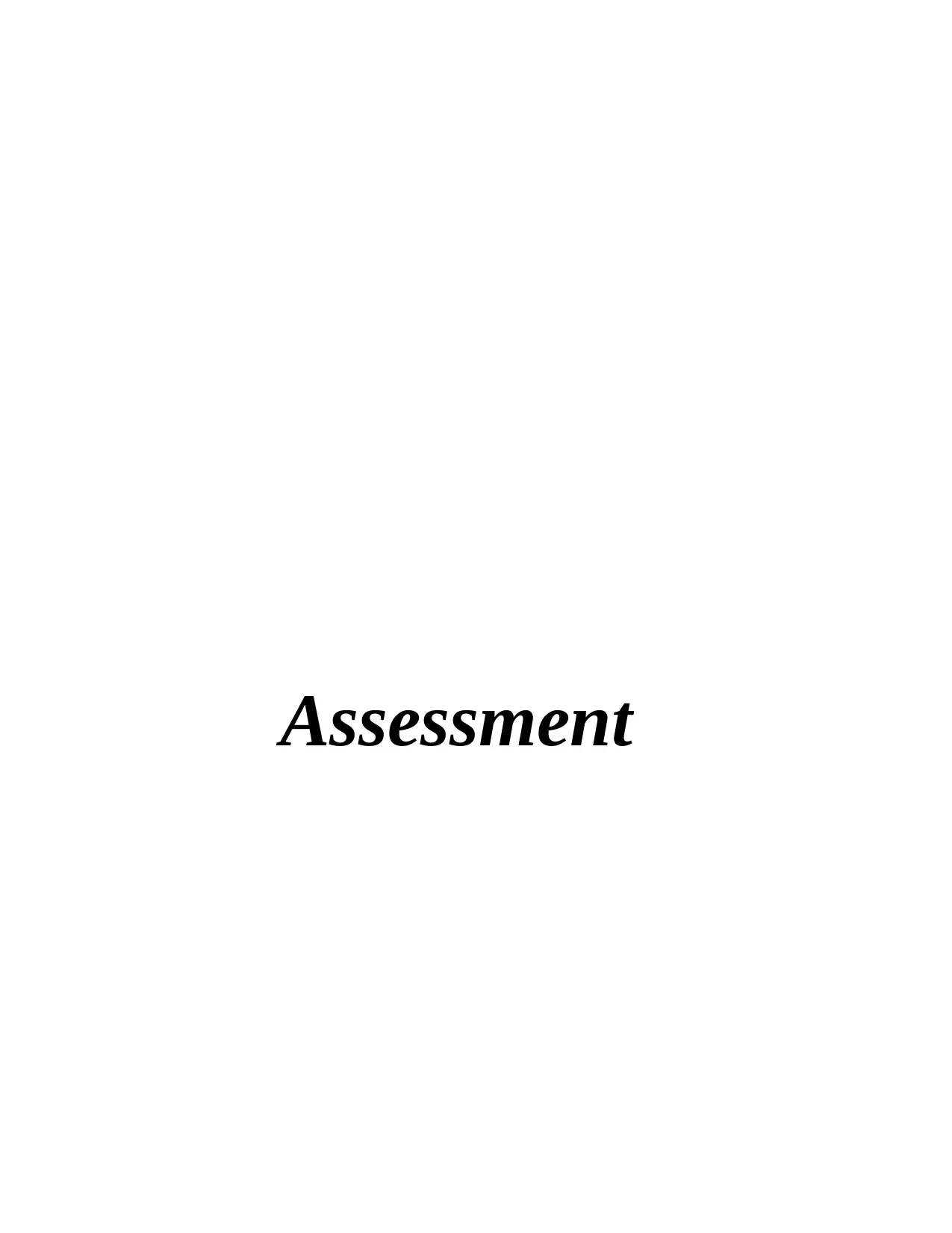
Assessment
Paraphrase This Document
Need a fresh take? Get an instant paraphrase of this document with our AI Paraphraser
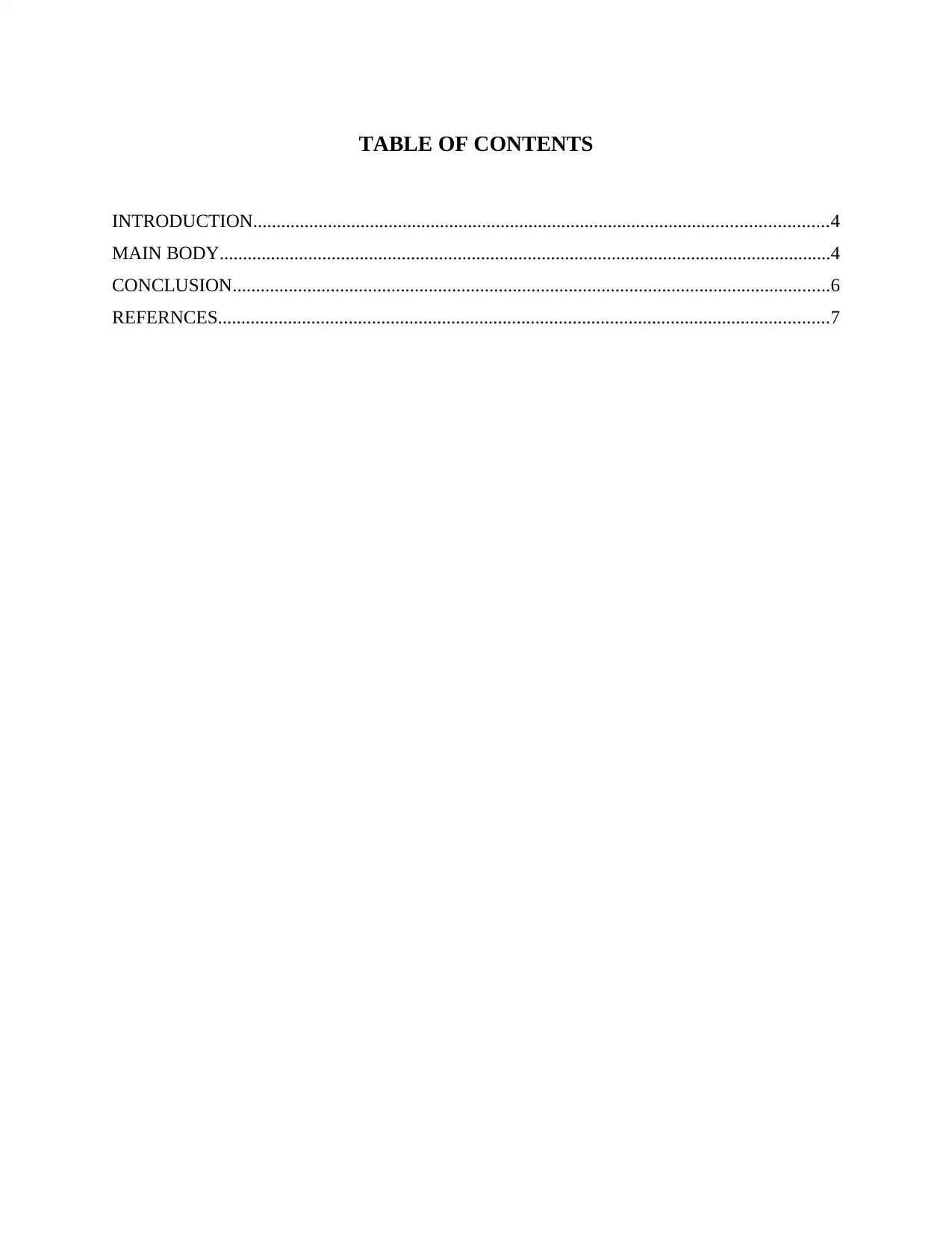
TABLE OF CONTENTS
INTRODUCTION...........................................................................................................................4
MAIN BODY...................................................................................................................................4
CONCLUSION................................................................................................................................6
REFERNCES...................................................................................................................................7
INTRODUCTION...........................................................................................................................4
MAIN BODY...................................................................................................................................4
CONCLUSION................................................................................................................................6
REFERNCES...................................................................................................................................7
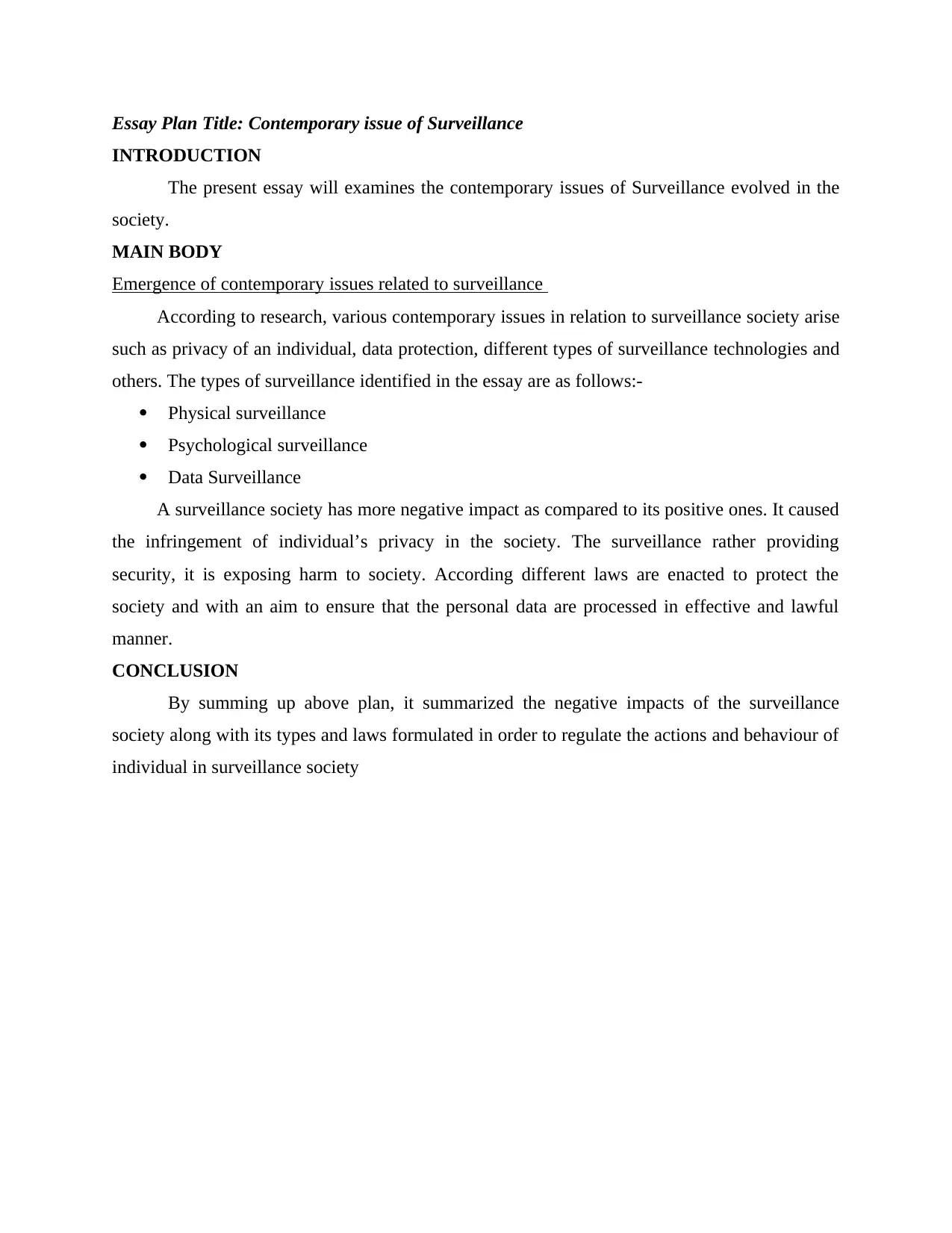
Essay Plan Title: Contemporary issue of Surveillance
INTRODUCTION
The present essay will examines the contemporary issues of Surveillance evolved in the
society.
MAIN BODY
Emergence of contemporary issues related to surveillance
According to research, various contemporary issues in relation to surveillance society arise
such as privacy of an individual, data protection, different types of surveillance technologies and
others. The types of surveillance identified in the essay are as follows:-
Physical surveillance
Psychological surveillance
Data Surveillance
A surveillance society has more negative impact as compared to its positive ones. It caused
the infringement of individual’s privacy in the society. The surveillance rather providing
security, it is exposing harm to society. According different laws are enacted to protect the
society and with an aim to ensure that the personal data are processed in effective and lawful
manner.
CONCLUSION
By summing up above plan, it summarized the negative impacts of the surveillance
society along with its types and laws formulated in order to regulate the actions and behaviour of
individual in surveillance society
INTRODUCTION
The present essay will examines the contemporary issues of Surveillance evolved in the
society.
MAIN BODY
Emergence of contemporary issues related to surveillance
According to research, various contemporary issues in relation to surveillance society arise
such as privacy of an individual, data protection, different types of surveillance technologies and
others. The types of surveillance identified in the essay are as follows:-
Physical surveillance
Psychological surveillance
Data Surveillance
A surveillance society has more negative impact as compared to its positive ones. It caused
the infringement of individual’s privacy in the society. The surveillance rather providing
security, it is exposing harm to society. According different laws are enacted to protect the
society and with an aim to ensure that the personal data are processed in effective and lawful
manner.
CONCLUSION
By summing up above plan, it summarized the negative impacts of the surveillance
society along with its types and laws formulated in order to regulate the actions and behaviour of
individual in surveillance society
⊘ This is a preview!⊘
Do you want full access?
Subscribe today to unlock all pages.

Trusted by 1+ million students worldwide

Paraphrase This Document
Need a fresh take? Get an instant paraphrase of this document with our AI Paraphraser
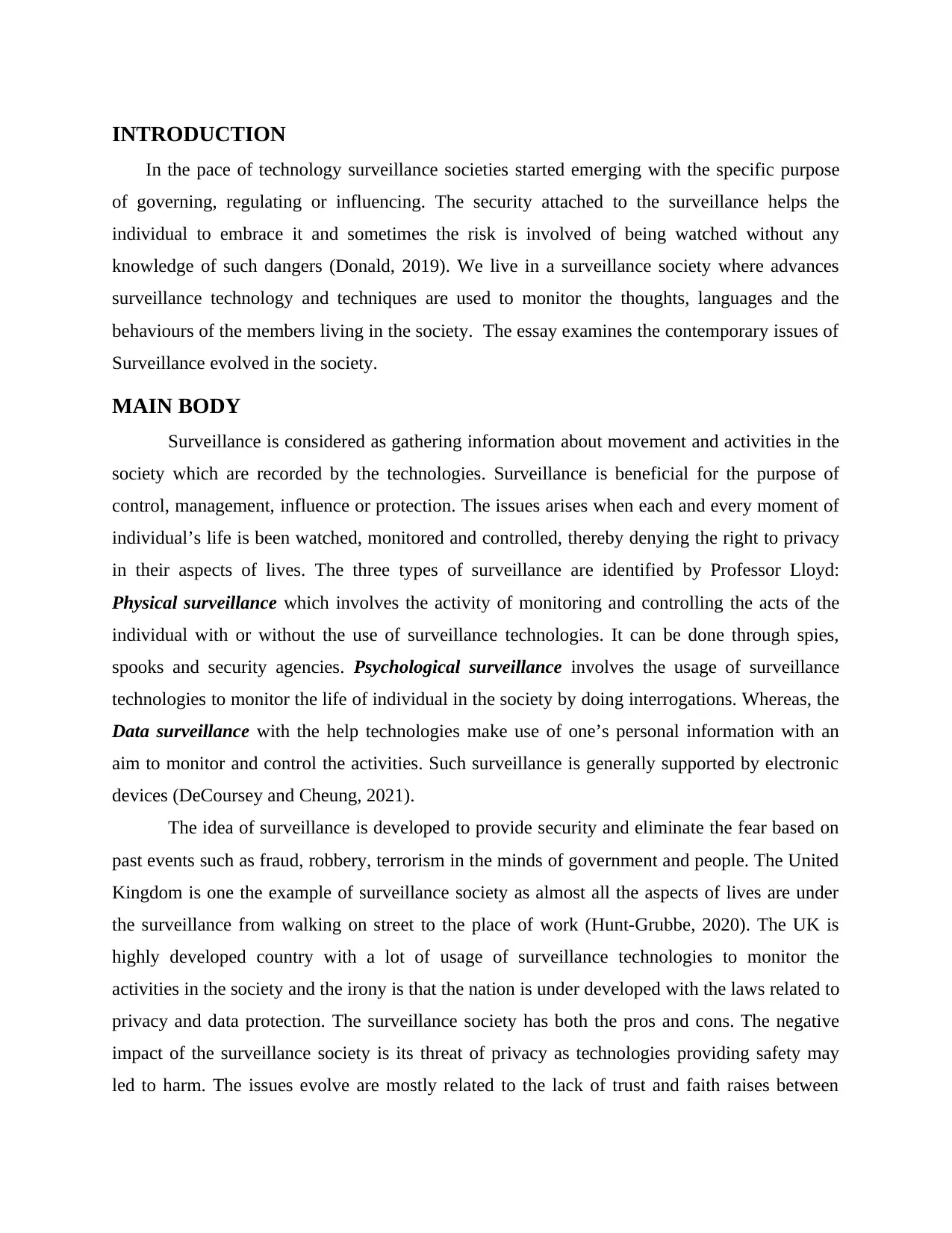
INTRODUCTION
In the pace of technology surveillance societies started emerging with the specific purpose
of governing, regulating or influencing. The security attached to the surveillance helps the
individual to embrace it and sometimes the risk is involved of being watched without any
knowledge of such dangers (Donald, 2019). We live in a surveillance society where advances
surveillance technology and techniques are used to monitor the thoughts, languages and the
behaviours of the members living in the society. The essay examines the contemporary issues of
Surveillance evolved in the society.
MAIN BODY
Surveillance is considered as gathering information about movement and activities in the
society which are recorded by the technologies. Surveillance is beneficial for the purpose of
control, management, influence or protection. The issues arises when each and every moment of
individual’s life is been watched, monitored and controlled, thereby denying the right to privacy
in their aspects of lives. The three types of surveillance are identified by Professor Lloyd:
Physical surveillance which involves the activity of monitoring and controlling the acts of the
individual with or without the use of surveillance technologies. It can be done through spies,
spooks and security agencies. Psychological surveillance involves the usage of surveillance
technologies to monitor the life of individual in the society by doing interrogations. Whereas, the
Data surveillance with the help technologies make use of one’s personal information with an
aim to monitor and control the activities. Such surveillance is generally supported by electronic
devices (DeCoursey and Cheung, 2021).
The idea of surveillance is developed to provide security and eliminate the fear based on
past events such as fraud, robbery, terrorism in the minds of government and people. The United
Kingdom is one the example of surveillance society as almost all the aspects of lives are under
the surveillance from walking on street to the place of work (Hunt-Grubbe, 2020). The UK is
highly developed country with a lot of usage of surveillance technologies to monitor the
activities in the society and the irony is that the nation is under developed with the laws related to
privacy and data protection. The surveillance society has both the pros and cons. The negative
impact of the surveillance society is its threat of privacy as technologies providing safety may
led to harm. The issues evolve are mostly related to the lack of trust and faith raises between
In the pace of technology surveillance societies started emerging with the specific purpose
of governing, regulating or influencing. The security attached to the surveillance helps the
individual to embrace it and sometimes the risk is involved of being watched without any
knowledge of such dangers (Donald, 2019). We live in a surveillance society where advances
surveillance technology and techniques are used to monitor the thoughts, languages and the
behaviours of the members living in the society. The essay examines the contemporary issues of
Surveillance evolved in the society.
MAIN BODY
Surveillance is considered as gathering information about movement and activities in the
society which are recorded by the technologies. Surveillance is beneficial for the purpose of
control, management, influence or protection. The issues arises when each and every moment of
individual’s life is been watched, monitored and controlled, thereby denying the right to privacy
in their aspects of lives. The three types of surveillance are identified by Professor Lloyd:
Physical surveillance which involves the activity of monitoring and controlling the acts of the
individual with or without the use of surveillance technologies. It can be done through spies,
spooks and security agencies. Psychological surveillance involves the usage of surveillance
technologies to monitor the life of individual in the society by doing interrogations. Whereas, the
Data surveillance with the help technologies make use of one’s personal information with an
aim to monitor and control the activities. Such surveillance is generally supported by electronic
devices (DeCoursey and Cheung, 2021).
The idea of surveillance is developed to provide security and eliminate the fear based on
past events such as fraud, robbery, terrorism in the minds of government and people. The United
Kingdom is one the example of surveillance society as almost all the aspects of lives are under
the surveillance from walking on street to the place of work (Hunt-Grubbe, 2020). The UK is
highly developed country with a lot of usage of surveillance technologies to monitor the
activities in the society and the irony is that the nation is under developed with the laws related to
privacy and data protection. The surveillance society has both the pros and cons. The negative
impact of the surveillance society is its threat of privacy as technologies providing safety may
led to harm. The issues evolve are mostly related to the lack of trust and faith raises between
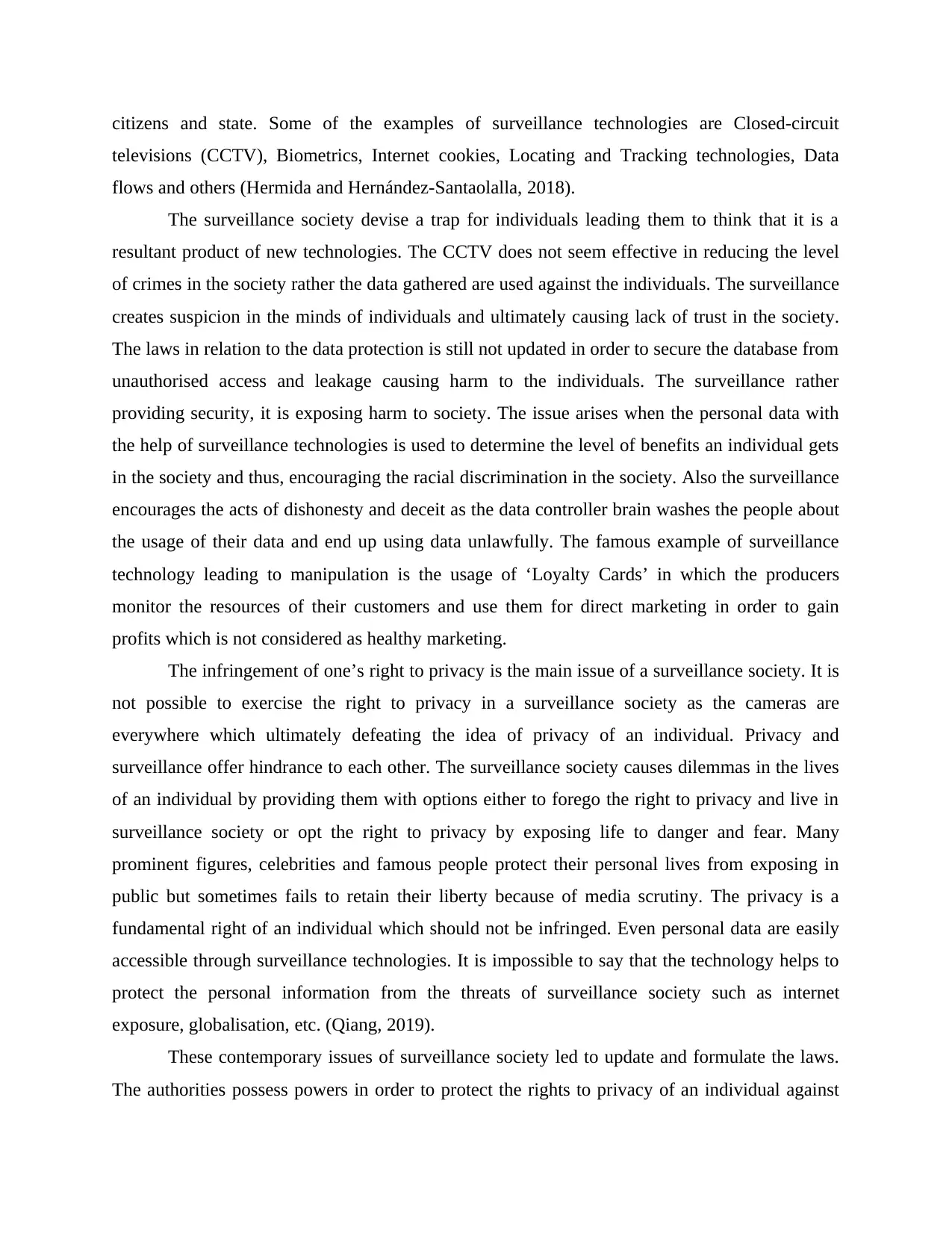
citizens and state. Some of the examples of surveillance technologies are Closed-circuit
televisions (CCTV), Biometrics, Internet cookies, Locating and Tracking technologies, Data
flows and others (Hermida and Hernández-Santaolalla, 2018).
The surveillance society devise a trap for individuals leading them to think that it is a
resultant product of new technologies. The CCTV does not seem effective in reducing the level
of crimes in the society rather the data gathered are used against the individuals. The surveillance
creates suspicion in the minds of individuals and ultimately causing lack of trust in the society.
The laws in relation to the data protection is still not updated in order to secure the database from
unauthorised access and leakage causing harm to the individuals. The surveillance rather
providing security, it is exposing harm to society. The issue arises when the personal data with
the help of surveillance technologies is used to determine the level of benefits an individual gets
in the society and thus, encouraging the racial discrimination in the society. Also the surveillance
encourages the acts of dishonesty and deceit as the data controller brain washes the people about
the usage of their data and end up using data unlawfully. The famous example of surveillance
technology leading to manipulation is the usage of ‘Loyalty Cards’ in which the producers
monitor the resources of their customers and use them for direct marketing in order to gain
profits which is not considered as healthy marketing.
The infringement of one’s right to privacy is the main issue of a surveillance society. It is
not possible to exercise the right to privacy in a surveillance society as the cameras are
everywhere which ultimately defeating the idea of privacy of an individual. Privacy and
surveillance offer hindrance to each other. The surveillance society causes dilemmas in the lives
of an individual by providing them with options either to forego the right to privacy and live in
surveillance society or opt the right to privacy by exposing life to danger and fear. Many
prominent figures, celebrities and famous people protect their personal lives from exposing in
public but sometimes fails to retain their liberty because of media scrutiny. The privacy is a
fundamental right of an individual which should not be infringed. Even personal data are easily
accessible through surveillance technologies. It is impossible to say that the technology helps to
protect the personal information from the threats of surveillance society such as internet
exposure, globalisation, etc. (Qiang, 2019).
These contemporary issues of surveillance society led to update and formulate the laws.
The authorities possess powers in order to protect the rights to privacy of an individual against
televisions (CCTV), Biometrics, Internet cookies, Locating and Tracking technologies, Data
flows and others (Hermida and Hernández-Santaolalla, 2018).
The surveillance society devise a trap for individuals leading them to think that it is a
resultant product of new technologies. The CCTV does not seem effective in reducing the level
of crimes in the society rather the data gathered are used against the individuals. The surveillance
creates suspicion in the minds of individuals and ultimately causing lack of trust in the society.
The laws in relation to the data protection is still not updated in order to secure the database from
unauthorised access and leakage causing harm to the individuals. The surveillance rather
providing security, it is exposing harm to society. The issue arises when the personal data with
the help of surveillance technologies is used to determine the level of benefits an individual gets
in the society and thus, encouraging the racial discrimination in the society. Also the surveillance
encourages the acts of dishonesty and deceit as the data controller brain washes the people about
the usage of their data and end up using data unlawfully. The famous example of surveillance
technology leading to manipulation is the usage of ‘Loyalty Cards’ in which the producers
monitor the resources of their customers and use them for direct marketing in order to gain
profits which is not considered as healthy marketing.
The infringement of one’s right to privacy is the main issue of a surveillance society. It is
not possible to exercise the right to privacy in a surveillance society as the cameras are
everywhere which ultimately defeating the idea of privacy of an individual. Privacy and
surveillance offer hindrance to each other. The surveillance society causes dilemmas in the lives
of an individual by providing them with options either to forego the right to privacy and live in
surveillance society or opt the right to privacy by exposing life to danger and fear. Many
prominent figures, celebrities and famous people protect their personal lives from exposing in
public but sometimes fails to retain their liberty because of media scrutiny. The privacy is a
fundamental right of an individual which should not be infringed. Even personal data are easily
accessible through surveillance technologies. It is impossible to say that the technology helps to
protect the personal information from the threats of surveillance society such as internet
exposure, globalisation, etc. (Qiang, 2019).
These contemporary issues of surveillance society led to update and formulate the laws.
The authorities possess powers in order to protect the rights to privacy of an individual against
⊘ This is a preview!⊘
Do you want full access?
Subscribe today to unlock all pages.

Trusted by 1+ million students worldwide
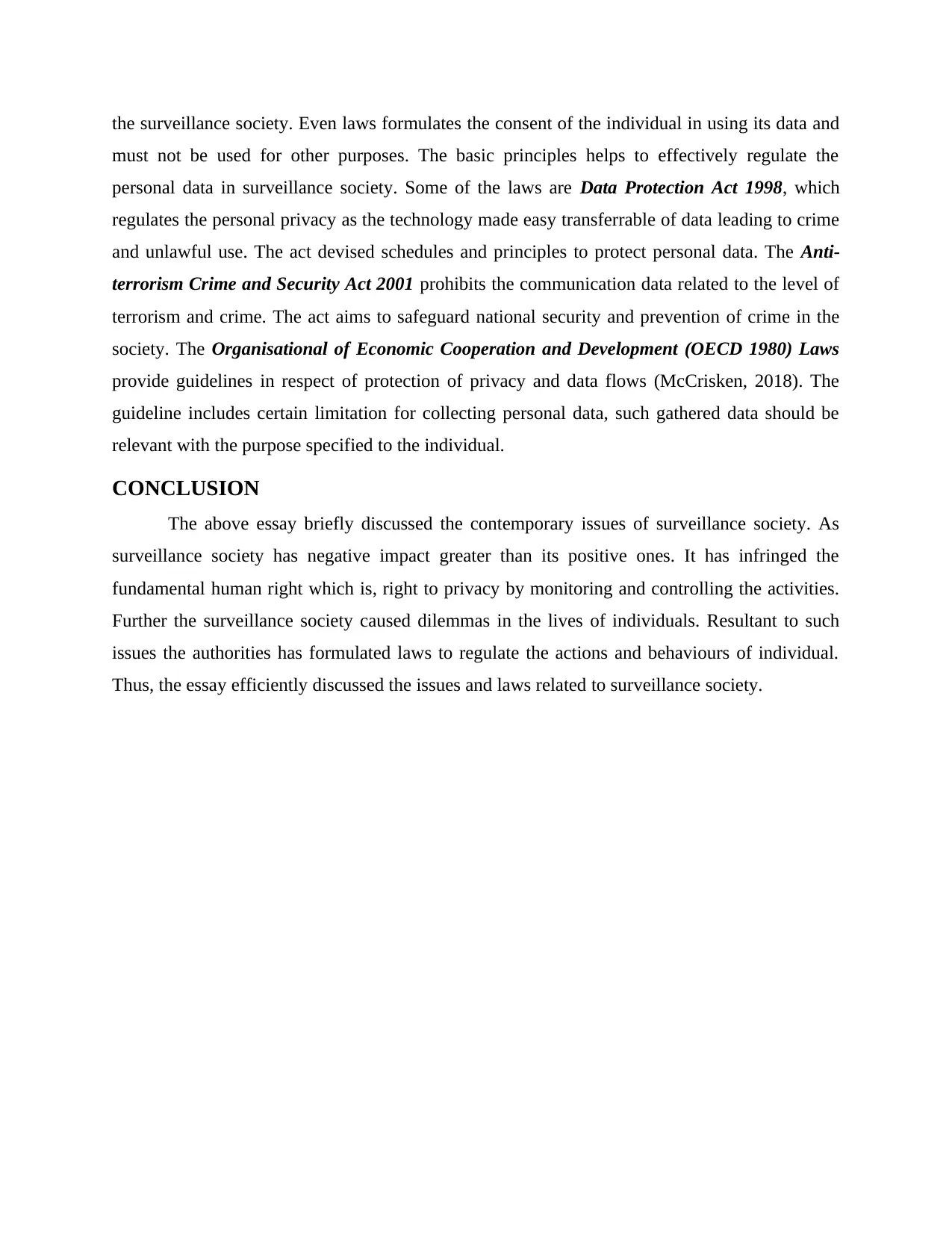
the surveillance society. Even laws formulates the consent of the individual in using its data and
must not be used for other purposes. The basic principles helps to effectively regulate the
personal data in surveillance society. Some of the laws are Data Protection Act 1998, which
regulates the personal privacy as the technology made easy transferrable of data leading to crime
and unlawful use. The act devised schedules and principles to protect personal data. The Anti-
terrorism Crime and Security Act 2001 prohibits the communication data related to the level of
terrorism and crime. The act aims to safeguard national security and prevention of crime in the
society. The Organisational of Economic Cooperation and Development (OECD 1980) Laws
provide guidelines in respect of protection of privacy and data flows (McCrisken, 2018). The
guideline includes certain limitation for collecting personal data, such gathered data should be
relevant with the purpose specified to the individual.
CONCLUSION
The above essay briefly discussed the contemporary issues of surveillance society. As
surveillance society has negative impact greater than its positive ones. It has infringed the
fundamental human right which is, right to privacy by monitoring and controlling the activities.
Further the surveillance society caused dilemmas in the lives of individuals. Resultant to such
issues the authorities has formulated laws to regulate the actions and behaviours of individual.
Thus, the essay efficiently discussed the issues and laws related to surveillance society.
must not be used for other purposes. The basic principles helps to effectively regulate the
personal data in surveillance society. Some of the laws are Data Protection Act 1998, which
regulates the personal privacy as the technology made easy transferrable of data leading to crime
and unlawful use. The act devised schedules and principles to protect personal data. The Anti-
terrorism Crime and Security Act 2001 prohibits the communication data related to the level of
terrorism and crime. The act aims to safeguard national security and prevention of crime in the
society. The Organisational of Economic Cooperation and Development (OECD 1980) Laws
provide guidelines in respect of protection of privacy and data flows (McCrisken, 2018). The
guideline includes certain limitation for collecting personal data, such gathered data should be
relevant with the purpose specified to the individual.
CONCLUSION
The above essay briefly discussed the contemporary issues of surveillance society. As
surveillance society has negative impact greater than its positive ones. It has infringed the
fundamental human right which is, right to privacy by monitoring and controlling the activities.
Further the surveillance society caused dilemmas in the lives of individuals. Resultant to such
issues the authorities has formulated laws to regulate the actions and behaviours of individual.
Thus, the essay efficiently discussed the issues and laws related to surveillance society.
Paraphrase This Document
Need a fresh take? Get an instant paraphrase of this document with our AI Paraphraser
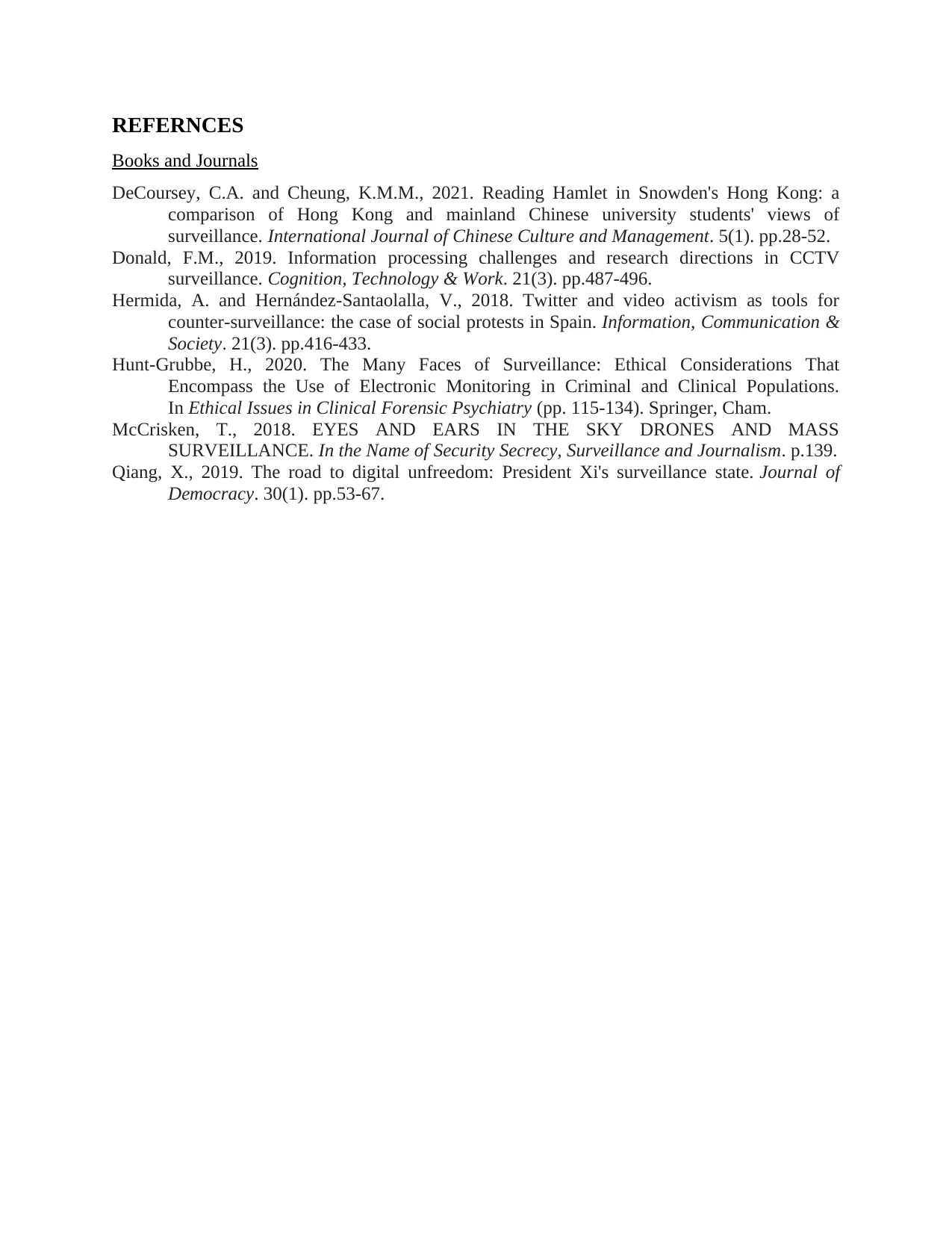
REFERNCES
Books and Journals
DeCoursey, C.A. and Cheung, K.M.M., 2021. Reading Hamlet in Snowden's Hong Kong: a
comparison of Hong Kong and mainland Chinese university students' views of
surveillance. International Journal of Chinese Culture and Management. 5(1). pp.28-52.
Donald, F.M., 2019. Information processing challenges and research directions in CCTV
surveillance. Cognition, Technology & Work. 21(3). pp.487-496.
Hermida, A. and Hernández-Santaolalla, V., 2018. Twitter and video activism as tools for
counter-surveillance: the case of social protests in Spain. Information, Communication &
Society. 21(3). pp.416-433.
Hunt-Grubbe, H., 2020. The Many Faces of Surveillance: Ethical Considerations That
Encompass the Use of Electronic Monitoring in Criminal and Clinical Populations.
In Ethical Issues in Clinical Forensic Psychiatry (pp. 115-134). Springer, Cham.
McCrisken, T., 2018. EYES AND EARS IN THE SKY DRONES AND MASS
SURVEILLANCE. In the Name of Security Secrecy, Surveillance and Journalism. p.139.
Qiang, X., 2019. The road to digital unfreedom: President Xi's surveillance state. Journal of
Democracy. 30(1). pp.53-67.
Books and Journals
DeCoursey, C.A. and Cheung, K.M.M., 2021. Reading Hamlet in Snowden's Hong Kong: a
comparison of Hong Kong and mainland Chinese university students' views of
surveillance. International Journal of Chinese Culture and Management. 5(1). pp.28-52.
Donald, F.M., 2019. Information processing challenges and research directions in CCTV
surveillance. Cognition, Technology & Work. 21(3). pp.487-496.
Hermida, A. and Hernández-Santaolalla, V., 2018. Twitter and video activism as tools for
counter-surveillance: the case of social protests in Spain. Information, Communication &
Society. 21(3). pp.416-433.
Hunt-Grubbe, H., 2020. The Many Faces of Surveillance: Ethical Considerations That
Encompass the Use of Electronic Monitoring in Criminal and Clinical Populations.
In Ethical Issues in Clinical Forensic Psychiatry (pp. 115-134). Springer, Cham.
McCrisken, T., 2018. EYES AND EARS IN THE SKY DRONES AND MASS
SURVEILLANCE. In the Name of Security Secrecy, Surveillance and Journalism. p.139.
Qiang, X., 2019. The road to digital unfreedom: President Xi's surveillance state. Journal of
Democracy. 30(1). pp.53-67.
1 out of 8
Related Documents
Your All-in-One AI-Powered Toolkit for Academic Success.
+13062052269
info@desklib.com
Available 24*7 on WhatsApp / Email
![[object Object]](/_next/static/media/star-bottom.7253800d.svg)
Unlock your academic potential
Copyright © 2020–2026 A2Z Services. All Rights Reserved. Developed and managed by ZUCOL.




